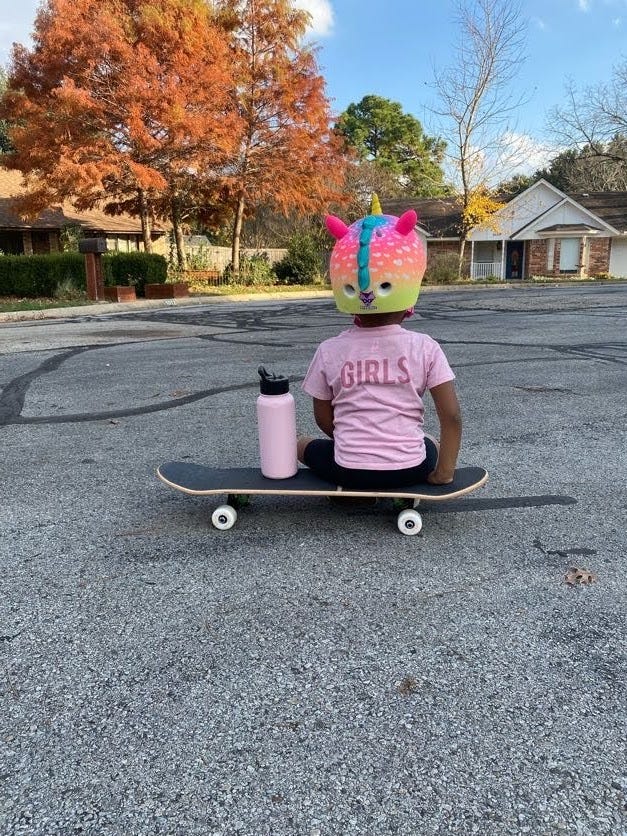Resisting the Metaverse and the Neomania Trap
Choosing Reality, the upcoming IHD Fast, and pics from Justin's visit
Hello good people and welcome to the Stuff They Never Told You! A few reminders…
The IHD bi-annual extended fast is on! I will begin my fast after breakfast tomorrow (Thursday, December 9) and eat again Saturday morning, but Justin and many other IHDers will be beginning later on throughout this week and into next weekend. Whether you go 48 hours or choose to do less, we hope you’ll consider the spirit of this challenge and join in with your own extended fast sometime over the next couple of weeks. For more details and guidance on the fast, see Justin’s post last week.
IHD Members be sure to check out our Pillar Experience Field Guide on Fasting in the member's community.
We will be focusing on expanding our library of Field Guides and Challenges next year as we take time to explore the pillar experiences more deeply. Also, more details on an upcoming War and Peace Daily Reader Challenge at the end, as well as pictures from Justin’s visit to see me in Texas. Now to the stuff!
ONE FROM THE AGES
“Life is an unfoldment, and the further we travel the more truth we can comprehend.” – Hypatia of Alexandra
ONE FROM TODAY
The polymath, Nassim Taleb, on the folly of neomania—the proclivity to overestimate how revolutionary new inventions will be and overstate the progress that technology will bring.
“Tonight I will be meeting friends in a restaurant (tavernas have existed for at least twenty-five centuries). I will be walking there wearing shoes hardly different from those worn fifty-three hundred years ago by the mummified man discovered in a glacier in the Austrian Alps. At the restaurant, I will be using silverware, a Mesopotamian technology, which qualifies as a “killer application” given what it allows me to do to the leg of lamb, such as tear it apart while sparing my fingers from burns. I will be drinking wine, a liquid that has been in use for at least six millennia. The wine will be poured into glasses, an innovation claimed by my Lebanese compatriots to come from their Phoenician ancestors, and if you disagree about the source, we can say that glass objects have been sold by them as trinkets for at least twenty-nine hundred years. After the main course, I will have a somewhat younger technology, artisanal cheese, paying higher prices for those that have not changed in their preparation for several centuries. Had someone in 1950 predicted such a minor gathering, he would have imagined something quite different. So, thank God, I will not be dressed in a shiny synthetic space-style suit, consuming nutritionally optimized pills while communicating with my dinner peers by means of screens… The food will be prepared using a very archaic technology (fire), with the aid of kitchen tools and implements that have not changed since the Romans (except in the quality of some of the metals used). I will be sitting on an (at least) three-thousand-year-old device commonly known as the chair (which will be, if anything, less ornate than its majestic Egyptian ancestor). And I will not be (transporting) to the restaurant with the aid of a flying motorcycle. I will be walking or, if late, using a cab from a century old technology….”
ONE FROM US
A couple of weeks ago, a plot of digital land in the Metaverse sold for $2.43 million dollars. If you’re like me, your reaction is a mixture of, “Wait, what?” and “Whatever. More bizarre tech stuff that I don’t care about.”
Until recently, I’ve been blissfully ignorant of the growing Metaverse conversation. But I finally looked into it more after a friend and writer that I respect sent me an article he’d written on the subject. Then came Thanksgiving when my wife’s cousin (a very smart man) brought up his recent fascination with all things Metaverse. He’d been soaking up everything he could learn on the subject and was eager to share with anyone who would listen.
I listened and proceeded to pour through some of the resources he sent me, but I couldn’t help feeling underwhelmed and unconvinced. Not that this Metaverse thing (people living more and more of their lives in virtual reality) wasn’t coming, but that I didn’t see the appeal. I felt like Tom Hanks watching the toy presentation in the movie Big: “I don’t get it.” I’m no oracle or tech savant, but here are my takeaways:
The Metaverse is a development that will continue to grow and become a more normal part of the modern ecosystem.
No one has any idea where it is going and what it is turning into.
The extent to which it will “revolutionize the world” is overstated.
And, while I’ll be open to adapting opinions as I see what it becomes, the greatest amount of personal fulfillment and societal flourishing will come from avoiding the Metaverse or treating it like a video game that requires rigid boundaries for healthy use. The greatest depth of living is only possible through reality.
In Antifragile, Nassim Taleb refers to the Lindy Effect, which claims that the future life span of any technology or idea is best predicted by how long it has been around. For example, books that have been around for 20 years are “proven” and will probably be around for twenty more, whereas a brand new bestseller is not guaranteed to garner any attention next year. We are all swept away by the new and certain that it will change everything about how we live, but more often than not, the things that have been passed down for generations have stuck around for a reason. They have proven antifragile over time because there is something synchronistic about the relationship between them, humans, and society.
I’ve seen this firsthand in education. Education is obsessed with new tech and flashy gizmos. Over a decade I’ve watched a constant succession of expensive new purchases and tech initiatives that were sure to “modernize” education and take learning to the next level. I’ve sat in training after training where people have tried to convince us that modern students won’t take an interest in anything that isn’t displayed on an interactive screen or interspersed with sparkling new effects. Yet in that time, the average student has grown far less capable of basic academic skills and less engaged in their learning.
Students light up when you teach a subject with passion and facilitate thoughtful debate. Expert teaching and the Socratic method are still the best way to prompt learning and spark passion in students. Reading, writing, and presenting are still the best ways for students to immerse themselves in content at a deep enough level to learn it well. At the elementary school level, the research is even more overwhelming for the benefits of a low to no-tech learning environment. Despite all our revolutionary technology, learning is still best accomplished through wisdom, respect for human nature, and the tools that have proven most effective for centuries.
Still, there is no denying the transformative nature of many modern technologies. As I write this from my desk at work, my best friend Justin Lind and his partner Marika are at my house, having just flown in from California. This is a friendship and business built almost entirely through video chat. Likewise, when Justin and I conducted an 8-week live course last year, we saw how Zoom technology helped turn six strangers into a close collection of friends who were sharing their most intimate hopes, rawest pains, and deepest values. This group was even developed the fun-natured teasing typical of friendships built in the physical world. When the conditions are right, new technologies create fantastic opportunities.
But they are not a substitution for the real deal. The live course would have been much better had we been able to sit together each evening over a meal. Likewise, time with Justin and Marika in person is orders of magnitude greater than the hours we spend chatting on a video call. And our time together is more valuable still when we are engaged in certain timeless pursuits: skateboarding, discussing great books, plotting dreams by a fire, hiking, or learning new skills. The greatest joys will always come by seeking what is true, what is good, and what is beautiful. The new is only valuable insomuch as it assists these pursuits.
—
Thank you for reading today and sharing with your kindred spirits! If you are digging this line of thought, there are a couple more great articles with a related theme:
The Romance of the Real by Michael Warren Davis
Don’t Forget You’re a Human: The Limitations of Virtual Education
And my book Setting the Bar gets right to the core of this conversation about the future soul of human societies
Also, as I alluded to above, Justin and I are planning to read War and Peace over the course of 2022. I got the idea from Jeremy Anderburg, the producer of the Art of Manliness podcast. War and Peace is 361 chapters that average about 3.5 short pages, so this fits perfectly as a daily reader. If interested, we’d love to have you along! We’ll be hosting the conversation throughout this challenge in our membership group. Justin and I both picked up this beautiful version. More details to come.
Finally, pictures below from Justin and Marika’s recent visit to see my family in Texas.
Have a great week! Life is too short to be normal!
Shane









Excellent. Glad to see more and more people really begin to question the necessity of all this shiny claptrap. When did we forget common sense? The precautionary principle? Have we not learned anything at all from the 20th century?
Your post brings to mind Thosh Collins' post (a wonderful human being you should get to know). Link here: https://www.instagram.com/p/CW8tz_EPBug/
My comment on that post, which also applies here:
"Not interested. No doubt a lot of people who feel they lack control or agency in the physical world will spend more time in VR, doing the things that make them feel better. But for the rest of us, who are sane and happy and healthy, there is a world of endless wonder to explore. How could I miss out on that?"
Yes, yes, amen! I'm the odd man out nearly everywhere I've taught lately because of my distaste for gadgets, gizmos, and laptops. I cam out-teach a laptop any day of the week. And these smart phones....These kids attachments to their phones is obsessive, slavelike and unnatural. My 1st period seems to hate me because I don't allow them to have them out in class. I mean, the threat of having their phone taken up elicits a reaction disproportionate to the action. It is disturbing. I want OUT of public education. The students, teachers, and administrators are no longer connected to reality. It is giving me anxiety and high blood pressure.